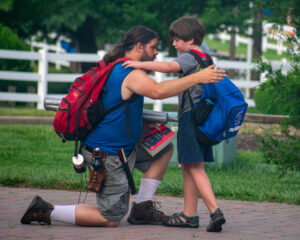1. Staff Hiring, Training & Supervision
Safety begins with the people responsible for your child. Strong camps have clear standards for hiring, screening, training, and observing staff throughout the season.
Questions to ask about staffing:
- How directors recruit and interview counselors.
- Whether they conduct background checks and reference checks for all adults.
- How many days of pre-season training staff receive.
- What in-season refreshers or evaluations they run.
- Who supervises counselors and how often groups are observed.
Look for camps that treat training as an ongoing process, not a quick orientation. Staff should know how to manage groups, identify concerns early, and communicate quickly with leadership.
If you’d like a structured list of tour questions to bring with you, the camp tour question checklist can help you stay organized on visits.
2. Camper-to-Staff Ratios & Group Sizes
Camper-to-staff ratios have a major impact on supervision and emotional safety. When groups are too large, quieter or anxious campers can get overlooked.
Key questions about group size:
- What are your camper-to-staff ratios for each age group?
- How many campers are typically in one group?
- Are there support staff or specialists in higher-risk areas?
- How do you adjust staffing during heat waves or busy periods?
Smaller groups allow staff to build connections, monitor behavior, and respond quickly when children need help. If you are also wondering whether your child is ready for camp routines in general, the age-by-age day camp readiness guide can provide additional context.
3. Lifeguards, Water Safety & Activity Supervision
Whether your child is swimming, boating, climbing, or playing sports, each activity area should have clear procedures and trained supervisors.
Ask camps to explain:
- What certifications lifeguards and activity specialists hold.
- How many lifeguards are on duty during each swim period.
- How campers are assessed and grouped by swim ability.
- How staff monitor water, ropes, boating, or adventure areas.
- How counselors and specialists coordinate supervision.
Strong camps can describe adult positioning, visual scanning techniques, and what happens when a camper needs assistance. For a broader look at how different programs structure their offerings, you can refer to the guide to top New Jersey summer camps.
4. Transportation, Arrival & Dismissal Safety
For many families, the day begins and ends on a bus or in car line. These transitions must be safe, consistent, and well-staffed.
Questions to ask about daily transitions:
- Who rides the buses and how those adults are trained.
- How pick-up and drop-off zones are organized.
- How attendance is tracked throughout the day.
- What happens if someone else needs to pick up your child.
- How late arrivals or early dismissals are handled.
You want clear routines — not improvisation. For a deeper dive into this topic, see Day Camps With Transportation: What Parents Should Know, which focuses entirely on busing and logistics.
5. Emergency Plans & Health Procedures
We all hope emergencies never occur, but responsible camps prepare for them thoroughly.
Key questions to ask about emergency readiness:
- Who serves as the safety or health coordinator?
- How the infirmary handles injuries, illnesses, and medications.
- What the severe weather plan involves.
- How drills are conducted for fire, shelter-in-place, or evacuation.
- How and when parents are notified about incidents.
Strong programs are transparent and confident when explaining their systems. They can show you radios, AEDs, and first aid locations without hesitation.
6. Communication & Parent Partnership
Safety includes how well the camp communicates with families. You want staff who value transparency, not a program that leaves parents guessing.
Questions to consider:
- How often families receive updates during the summer.
- Who to contact when questions arise.
- How the camp responds to social or emotional concerns.
- How the camp communicates both good news and issues.
Camp should feel like a partner in your child’s growth. For a broader decision framework, the article on choosing the right summer day camp walks through what to ask and how to interpret the answers.
7. Turn This Into Your Personal Safety Checklist
The best way to assess safety is to visit camps in person:
- Walk the grounds and watch how staff interact with campers.
- Observe transitions between activities and at the pool or lake.
- Ask direct questions using a printed checklist.
- Compare your impressions across multiple programs.
If you’re gathering options, you can also explore a data-based look at day camp quality and the Top 10 Summer Camps in New Jersey to see how different programs present their safety and program depth.
When you’re ready to see safety and supervision in action at Liberty Lake, you can schedule a tour, email fun@libertylakedaycamp.com, or call 609-499-7820.
Frequently Asked Questions
What should parents look for when evaluating day camp safety?
Look at staff training, camper-to-counselor ratios, aquatic standards, emergency procedures, facility inspections, transportation routines, and how clearly the camp communicates with families.
How important is staff training?
It’s critical. Well-trained staff know how to supervise groups, respond to problems, and follow procedures, which dramatically reduces risk.
What safety standards should a camp have for pools and lakes?
Certified lifeguards, clear swim zones, buddy systems, regular drills, and a designated aquatics leader are all key components of aquatic safety.
How can I evaluate emergency and medical readiness?
Ask who handles medical issues, how emergencies are managed, what drills are run, where AEDs are located, and how you’ll be notified if something happens.
Do transportation and pick-up procedures matter for safety?
Yes. Bus and carline procedures are part of the overall safety system. Camps should have clear, well-supervised routines and strong communication about any changes.

 Schedule A Tour
Schedule A Tour Contact Us
Contact Us